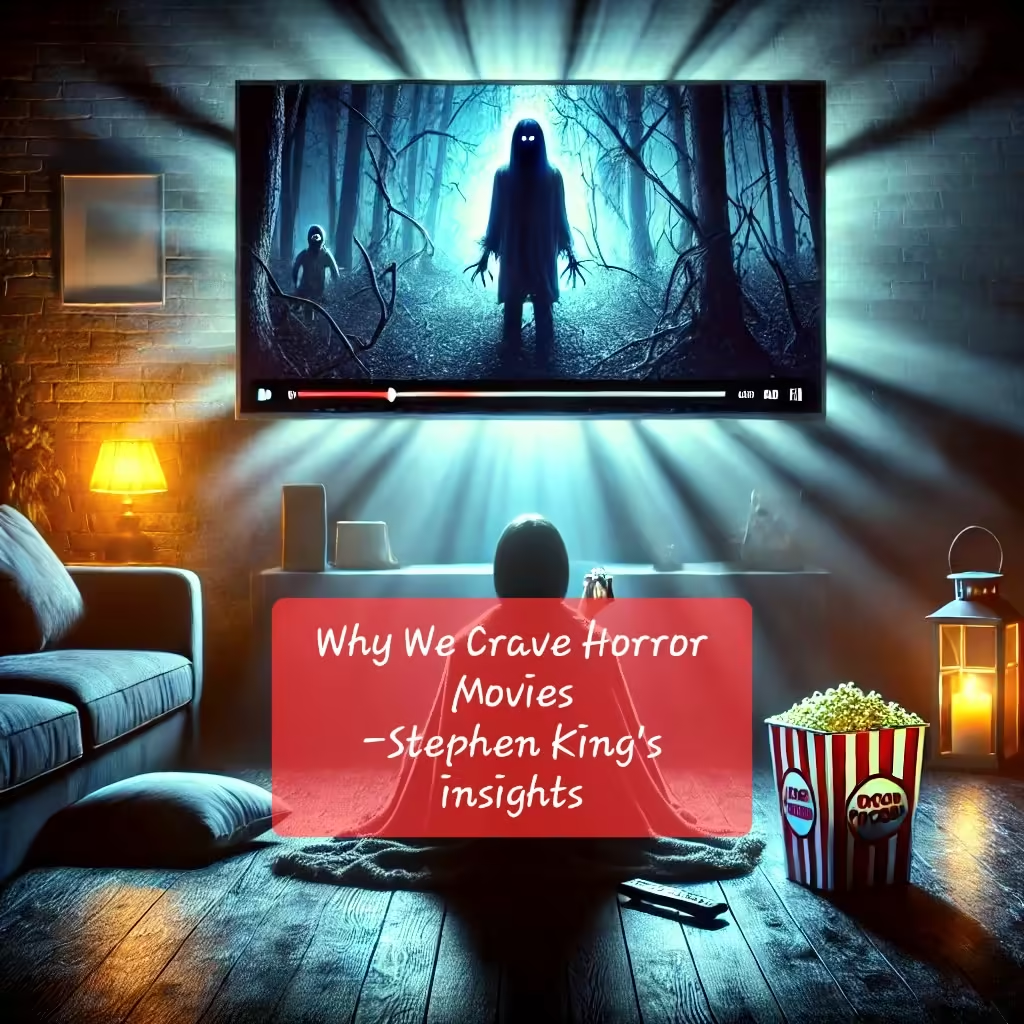
An in-depth analysis of Stephen King’s insights
Why We Crave Horror Movies
Horror movies have always been a fascinating genre, drawing audiences to explore the darker side of human nature. But why are we so captivated by these spine-chilling films? Stephen King, the master of horror fiction, explores this question in his insightful analysis of Why We Crave horror movie.
This article will look into King’s analysis and consider contemporary perspectives on our love for horror. We will explore the emotional, psychological, and social aspects behind this enduring appeal, focusing on how these movies tap into what King calls our “anticivilization emotions” focusing why we crave horror movies.
1. The Thrill of the Forbidden: unleashing anticivilization emotions
Horror films allow us to experience emotions that we usually suppress in our daily lives. Stephen King refers to this as our “anticivilization emotions,” which encompass the primal urges that society often conditions us to hide. Watching horror films provides a safe space to let these feelings surface.
Key Analysis: When we watch a terrifying scene unfold, our heart races, and our adrenaline spikes. This thrill helps us confront and manage our fear of the unknown, all while being safely seated on our couch. These movies serve as a controlled environment where we can enjoy feeling scared, angry, or even amused by dark humor. Such emotions would be considered inappropriate or dangerous to express in real life, but horror offers a temporary release.
2. Stephen King’s perspective: Why We Crave Horror Movies
Stephen King’s essay, Why We Crave Horror Movies, provides timeless insight into why we flock to horror. He argues that the genre acts as a societal catharsis, purging negative emotions and reinforcing our humanity. According to King, horror movies help us maintain our psychological health by “exercising” the darker aspects of our psyche, like sadism and fear.
Stephen King’s Analysis: King explains that horror movies are “a celebration of antisocial emotions.” By watching them, we are, in a way, allowed to be “mentally ill.” This sounds alarming, but King clarifies that confronting our fears in a safe, controlled environment helps us manage and even appreciate the stability of our regular lives.
3. The psychology of subconscious of horror
Another reason we crave horror is the genre’s ability to tap into the subconscious mind. Psychologists believe that horror movies often mirror our deepest anxieties, acting as a form of therapy. For instance, films like The Exorcist or The Babadook delve into themes of possession, grief, and parental fears.
Latest Research: Recent studies show that horror movie fans may be more psychologically resilient. A study published in 2020 in Personality and Individual Differences found that people who enjoy horror movies are more likely to cope better with real-world fears like the COVID-19 pandemic.
4. Why We Crave Horror Movies by Stephen King: A Historical Perspective
In his essay, King also contextualizes horror’s appeal within history. Humans have always been drawn to macabre stories—from folktales and legends to classic Gothic novels. What King calls “anticivilization emotions” have been depicted in everything from Greek tragedies to Shakespearean plays.
Historical Context:
Horror satisfies our need for storytelling that pushes the boundaries of social norms. Whether it’s tales of vampires, zombies, or haunted houses, these narratives explore themes like death, the supernatural, and the fragility of the human mind.
5. Facing Fears Together: The Social Aspect of Horror
Horror movies are often enjoyed in groups, whether at a theater or at home during a Netflix binge. This shared experience heightens the emotions and makes the fear more palpable. As Stephen King mentions, “we are daring the nightmare.” But we’re not alone; we’re daring it together.
Contemporary Analysis of why we crave horror movies by Stephen King
In the digital age, horror has evolved with social media interactions, where viewers share their reactions live. This shared experience not only amplifies the thrill but also creates a sense of community among horror fans.
Why Horror appeals to us today
Stephen King’s essay remains as relevant today as it was decades ago. Our craving for horror movies stems from a complex mix of psychological, emotional, and social factors. They allow us to indulge in “anticivilization emotions,” explore our fears, and feel a sense of relief when we survive the fright.
In a world full of uncertainties, horror movies offer a paradoxical comfort. By confronting fictional horrors, we feel better equipped to handle the real ones. Whether it’s through Stephen King’s classic films or the latest Netflix thriller, horror will continue to captivate audiences for years to come.
FAQs
Q1: What is Stephen King’s main point in Why We Crave Horror Movies?
Stephen King argues that we watch horror movies to satisfy our “anticivilization emotions.” He believes that horror helps us confront fears, purge negative emotions, and reinforce our humanity.
Q2: What are anticivilization emotions according to Stephen King?
Anticivilization emotions refer to the primal urges and instincts that society typically suppresses. These include fear, aggression, and the morbid curiosity about death and destruction, which horror movies safely bring to the surface.
Q3: How does Why We Crave Horror Movies by Stephen King relate to modern psychological theories?
King’s insights align with current research showing that horror movies can be therapeutic, helping us deal with anxiety and real-world fears. The controlled fear experienced in horror is believed to strengthen psychological resilience.